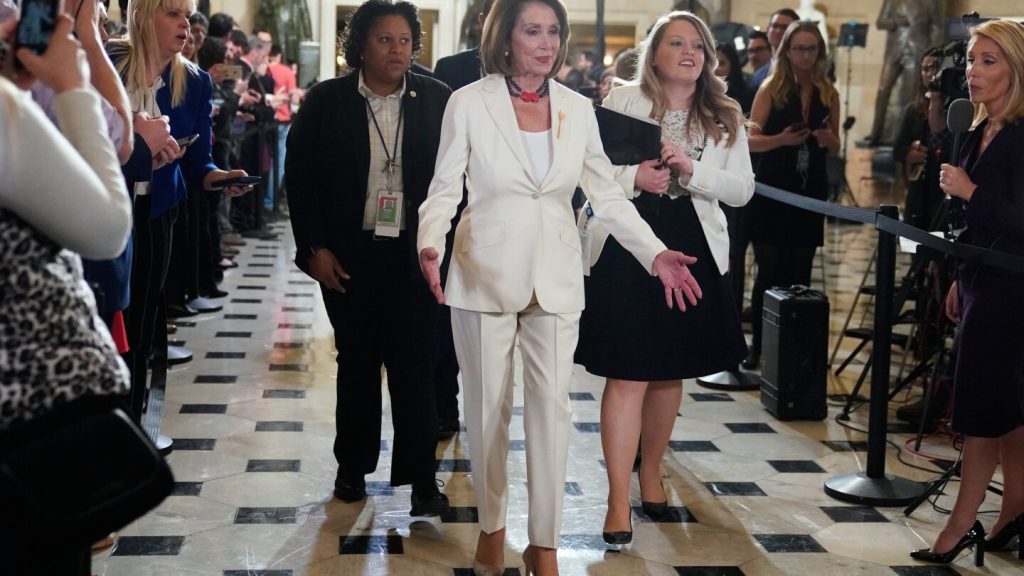Listen to the article
Nancy Pelosi’s Linguistic Legacy Lives On as Political Career Winds Down
WASHINGTON — Nancy Pelosi is bringing her historic career in the U.S. House to a close, but the linguistic footprint of America’s first female Speaker will echo through the halls of Congress for years to come.
As the 85-year-old San Francisco Democrat announced her decision not to seek reelection, she did so with characteristic precision, deploying one of her signature phrases in a video address to constituents: “Know your power.” It was a fitting capstone to a career defined as much by her leadership as by her distinctive way with words.
In an era when the Democratic Party searches for direction while confronting the lingering influence of former President Donald Trump, Pelosi’s verbal legacy—what many call her “Pelosi-isms”—remains a blueprint for political communication. These phrases aren’t mere slogans but organizing principles that distill complex political philosophies into accessible language.
“My ‘why’ was 1 in 5 children in America lives in poverty, goes to sleep hungry at night,” Pelosi told The Associated Press during a summer interview at her Washington office, explaining one of her core motivating principles. “Politics is a hard business, particularly for women. It’s not for the faint of heart.”
Pelosi’s power-wielding rhetoric was perhaps most visibly on display during a now-famous 2018 Oval Office confrontation with then-President Trump over funding for his proposed border wall. With cameras rolling, Trump attempted to undermine her by suggesting she faced political problems of her own.
“Mr. President, please don’t characterize the strength that I bring to this meeting as the leader of the House Democrats who just won a big victory,” Pelosi responded, in a moment that crystallized her unflinching approach to power. Her subsequent exit from the White House, captured by photographers as she strode confidently in a burnt orange coat, became an iconic image of female political authority.
The San Francisco representative’s talent for memorable phrases isn’t accidental but strategic. “Diversity is our strength. Unity is our power” has been one of her most frequently deployed mantras, reflecting both her philosophy of inclusive politics and tactical approach to holding together the Democratic caucus.
“We take pride in our diversity, but unless we’re unified we’re not going to achieve what our goal is,” she explained about the Democratic side of the aisle. “And that’s something that people should fear. It’s our strength.”
For Pelosi, language is inseparable from action. Her adaptation of the feminist rallying cry “Don’t agonize, organize”—originally popularized by activist Florynce “Flo” Kennedy—encapsulates her pragmatic approach to political obstacles.
“What do you gain by agonizing?” Pelosi asks rhetorically. “The most important thing is time. It’s the most precious commodity of all. So why are you using your time, agonizing over this? We organize.”
Her tactical philosophy extends to relationship management in Washington’s complex power ecosystem. “Treat everyone as a friend, but know who your friends are,” she advises, crediting the late Rep. Lindy Boggs for teaching her that “not every fight should be your last fight.”
“Everybody is a resource to you,” she explained. “You never know where a vote might come from.”
As she prepares to complete her final year in Congress, Pelosi has increasingly drawn on historical touchstones to frame the current political moment. She often references the national anthem to remind her colleagues of their purpose: “We have to prove ‘through the night that our flag is still there.'”
Even her self-care advice comes packaged in memorable wordplay. “Go home and recreate to recreate,” she tells fellow lawmakers, though she admits with characteristic candor, “I don’t always do it myself.” For Pelosi personally, a different maxim applies: “Resting is rusting.”
As Pelosi departs the spotlight after decades at the center of American politics, her linguistic legacy remains intact—a testament to her understanding that in politics, the power of language is inseparable from the language of power.
Fact Checker
Verify the accuracy of this article using The Disinformation Commission analysis and real-time sources.




9 Comments
Pelosi’s legacy of quotable quips and clear communication could be a model for politicians. Her focus on issues like child poverty shows a principled approach, even if one may disagree with her policies.
Agreed, her ability to distill complex ideas into memorable phrases is a valuable skill in politics. Whether one aligns with her views or not, her rhetorical style is admirable.
While Pelosi’s rhetoric may have rallied her base, some of her more combative language could be seen as divisive. Striking the right balance between principled conviction and unifying language is an ongoing challenge for leaders.
That’s a fair point. Effective political communication requires nuance to bring people together, not just energize one’s own supporters. Pelosi’s legacy offers lessons in both the power and perils of rhetoric.
Pelosi’s announcement marks the end of an era. Regardless of one’s politics, her trailblazing role as the first female Speaker of the House is a historic achievement. The ‘Pelosi-isms’ that defined her tenure will be studied by future politicians.
While Pelosi’s legacy is undoubtedly shaped by her political accomplishments, her communication style has also left a significant mark. Crafting memorable phrases that capture the public imagination is a skill worth studying, regardless of one’s ideological leanings.
The article highlights Pelosi’s skill at translating complex policy into accessible language. This ability to ‘distill’ ideas is an underrated but vital talent in today’s fast-paced, sound-bite driven political landscape.
Pelosi’s ‘Pelosi-isms’ may not have always been universally popular, but they did make her a memorable figure. As she departs the political stage, it will be interesting to see if her rhetorical legacy lives on in the next generation of Democrats.
I’m curious to see how Pelosi’s successor will continue or depart from her distinctive communication style. Maintaining a clear, concise, and compelling message is crucial for any leader, but the approach can vary widely.